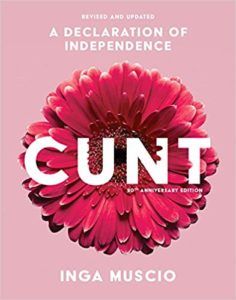
Reading CUNT in Public (And Other Ways to Let Books Help You Through This Week)
“If it is at all possible to completely avoid contact with the judicial sector of society, I suggest doing so with vigor.” —Inga Muscio, Cunt
Women and other fellow survivors: Breathe. Rest. Escape where you can: into quiet moments alone. Into a book.
You owe yourself that. Last week was brutal. Watching Dr. Christine Blasey Ford relive her trauma before a largely impervious Republican senate hurt. It was empowering, in the sense that it reminded us that we can voice our own traumas, no matter how long ago they occurred, and that doing so is valid and valuable…but it also left many of us reliving the acts of violence we’ve endured.
That isn’t easy. And waiting for the drastically limited FBI investigation into Kavanaugh’s misdeeds to conclude, and waiting to see if those snippets of truth will make a difference (enough) to the voting senators: that isn’t going to be easy, either.
This isn’t a world that’s friendly to women. We have always known that. This newest reminder is painful but unsurprising.
As we wait, we have to remember to engage in self-care. Self-care is critical regardless, but all the more so when you’re staring down blatant inequality this way. Remind yourself that you are valuable, that you are worthy, and that your voice is irreplaceable, even if the patriarchal system does not acknowledge it as such. Seek out peaceful spaces. Indulge in supportive company. Be healthy.

My first impulse was to take it to a local bar where I once (okay, on election night 2016) had a verbal spat with the bartender, who thinks referring to CNN as the “Clinton News Network” is really cute and clever. I slid onto a barstool during happy hour and cracked that title right in his face.
I didn’t know much about the book until then, but from its opening pages, it proved to be an absolute release. Forget the offended bartender (I did, very quickly); this book was feeding me with something more than the satisfaction of being feminist in the direction of someone who finds feminism gross.
It acknowledged the violence and erasure that women face on a daily basis. It said that the reclamation of our terms, our bodies, and our freedom has a ripple effect. It encouraged looking at everything differently: how we consume, how we bleed, what we read, whom we engage, what we listen to. It spoke frankly about abortion and about confronting misogynistic media in really disruptive ways.
The 20th anniversary edition includes updates covering both the book’s impact in newly allied men’s lives—stories of big, burly union guys flooding Muscio with words of admiration are delightful and hopeful—and ground not addressed in the first version, like trans inclusion, which is critical to consider as we address gendered violence.
It is an absolutely indispensable, encouraging, warm-embrace of a book. Right now, it’s even more of a poultice.
I’ve taken it out for additional public reading sessions since. I no longer do it to offend (as Muscio points out, that word isn’t actually offensive, anyway), but still knowing that people will react to the cover. And that’s okay. If someone says something to me about Cunt, it’s a possible opening to have an honest discussion about women’s equality, and I’m cool with that. (Sometimes. If someone interrupts your reading to ask what it’s about this week, and you don’t have the energy to respond: they’re free to Google it.)
This weekend I opened it out with my boyfriend and fell onto the sentence above almost immediately: a sympathetic reminder that the judicial system really wasn’t designed to protect women’s interests, and usually doesn’t. Oh, do we know. Still, Muscio’s suggestions for improving women’s spaces were life-giving. She addresses the reality of the male-centric systems we navigate, but offers ways to live beyond them: learn self-defense. Call out abuses where you see them. Immerse yourself in women’s work. Work with women.
Know that the world can be better.
This book is a battle cry.
I plan to treat myself to moments with Inga in the tough spots this week: when the news becomes too oppressive; when I need to pump myself up for yet another plea to a senator’s answering machine. I may take her out in public; I may simply read her at home, alone. Wherever I meet her, her words will give me courage. And I heartily recommend the title to anyone looking for a similar sort of pep talk or escape.
Or choose your own feminist treatise: Jessica Valenti’s Sex Object, or Chimamanda Ngozi Adichie’s We Should All Be Feminists, or Roxane Gay’s Not That Bad. Whatever touchstone has empowered you in the past: give yourself the gift of a revisit this week. Carve out time alone and curl up with it in a secluded space, or take it into public and be an unapologetic, silent, engrossed reminder that we’re all out there fighting, between the marches and the calls.
Seek out the bookish company of someone who’s fighting the same fight, via pen and paper and bold declarations. Send copies out to women who really need the boost. Immerse yourself in truths deeper than the judiciary committee appears prepared to handle. Know that we’ll persist. Read, and fight, on.











